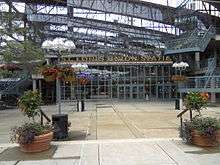Union Station (St. Louis)
St. Louis Union Station | |||||||||||||||||||||||||||||||||||||||||||||||||||||||||||||||||||||||||||
|---|---|---|---|---|---|---|---|---|---|---|---|---|---|---|---|---|---|---|---|---|---|---|---|---|---|---|---|---|---|---|---|---|---|---|---|---|---|---|---|---|---|---|---|---|---|---|---|---|---|---|---|---|---|---|---|---|---|---|---|---|---|---|---|---|---|---|---|---|---|---|---|---|---|---|---|
.jpg) Outside the station is Carl Milles' fountain sculpture Meeting Waters | |||||||||||||||||||||||||||||||||||||||||||||||||||||||||||||||||||||||||||
| Location |
1820 Market Street St. Louis, Missouri 63103 | ||||||||||||||||||||||||||||||||||||||||||||||||||||||||||||||||||||||||||
| Owned by | Bi-State Development Agency dba Metro | ||||||||||||||||||||||||||||||||||||||||||||||||||||||||||||||||||||||||||
| Line(s) |
St. Louis Metrolink | ||||||||||||||||||||||||||||||||||||||||||||||||||||||||||||||||||||||||||
| Platforms | 1 | ||||||||||||||||||||||||||||||||||||||||||||||||||||||||||||||||||||||||||
| Tracks | 2 | ||||||||||||||||||||||||||||||||||||||||||||||||||||||||||||||||||||||||||
| Connections |
MetroBus: 4, 41, and 97 Megabus (to Memphis, Tennessee, Kansas City, Missouri and Chicago, Illinois) | ||||||||||||||||||||||||||||||||||||||||||||||||||||||||||||||||||||||||||
| Construction | |||||||||||||||||||||||||||||||||||||||||||||||||||||||||||||||||||||||||||
| Parking | Yes; Paid | ||||||||||||||||||||||||||||||||||||||||||||||||||||||||||||||||||||||||||
| Disabled access | Accessible | ||||||||||||||||||||||||||||||||||||||||||||||||||||||||||||||||||||||||||
| Other information | |||||||||||||||||||||||||||||||||||||||||||||||||||||||||||||||||||||||||||
| Station code | STL | ||||||||||||||||||||||||||||||||||||||||||||||||||||||||||||||||||||||||||
| History | |||||||||||||||||||||||||||||||||||||||||||||||||||||||||||||||||||||||||||
| Opened | 1892-94 | ||||||||||||||||||||||||||||||||||||||||||||||||||||||||||||||||||||||||||
| Rebuilt | 1985 | ||||||||||||||||||||||||||||||||||||||||||||||||||||||||||||||||||||||||||
| Services | |||||||||||||||||||||||||||||||||||||||||||||||||||||||||||||||||||||||||||
|
Metro/Taxis/Megabus
| |||||||||||||||||||||||||||||||||||||||||||||||||||||||||||||||||||||||||||
|
St. Louis Union Station | |||||||||||||||||||||||||||||||||||||||||||||||||||||||||||||||||||||||||||
 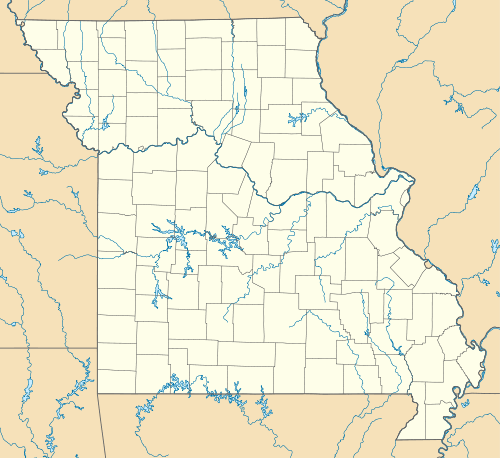  | |||||||||||||||||||||||||||||||||||||||||||||||||||||||||||||||||||||||||||
| Location |
St. Louis, Missouri | ||||||||||||||||||||||||||||||||||||||||||||||||||||||||||||||||||||||||||
| Coordinates | 38°37′40.9″N 90°12′28.34″W / 38.628028°N 90.2078722°WCoordinates: 38°37′40.9″N 90°12′28.34″W / 38.628028°N 90.2078722°W | ||||||||||||||||||||||||||||||||||||||||||||||||||||||||||||||||||||||||||
| Built | 1892-94 | ||||||||||||||||||||||||||||||||||||||||||||||||||||||||||||||||||||||||||
| Architect | Theodore Link | ||||||||||||||||||||||||||||||||||||||||||||||||||||||||||||||||||||||||||
| Architectural style | Romanesque Revival | ||||||||||||||||||||||||||||||||||||||||||||||||||||||||||||||||||||||||||
| NRHP Reference # | 70000888[1] | ||||||||||||||||||||||||||||||||||||||||||||||||||||||||||||||||||||||||||
| Significant dates | |||||||||||||||||||||||||||||||||||||||||||||||||||||||||||||||||||||||||||
| Added to NRHP | June 15, 1970 | ||||||||||||||||||||||||||||||||||||||||||||||||||||||||||||||||||||||||||
| Designated NHL | December 30, 1970[2] | ||||||||||||||||||||||||||||||||||||||||||||||||||||||||||||||||||||||||||
St. Louis Union Station, a National Historic Landmark, was a passenger intercity train terminal in St. Louis, Missouri. Once the world's largest and busiest train station, it was converted in the early 1980s into a hotel, shopping center, and entertainment complex. Today, it also continues to serve local rail (MetroLink) transit passengers on the Red and Blue Lines. Amtrak is served a ¼ mi east from the station at the Gateway Multimodal Transportation Center.
History
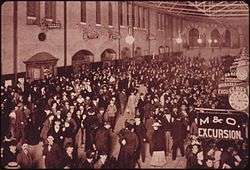
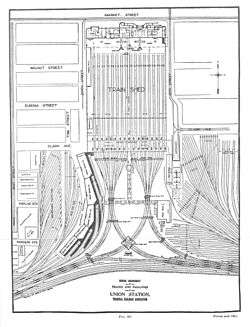
The station opened on September 1, 1894, and was owned by the Terminal Railroad Association of St. Louis. The station was designed by Theodore Link, and included three main areas: the Headhouse and the Midway, and the 11.5-acre (47,000 m2) Train Shed designed by civil engineer George H. Pegram.[3] The headhouse originally housed a hotel, a restaurant, passenger waiting rooms and railroad ticketing offices. It featured a gold-leafed Grand Hall, Romanesque arches, a 65-foot (20 m) barrel-vaulted ceiling and stained-glass windows. The clock tower is 280 feet (85 m) high.
Union Station's headhouse and midway are constructed of Indiana limestone and initially included 42 tracks under its vast trainshed terminating in the stub-end terminal.
At its height, the station combined the St. Louis passenger services of 22 railroads, the most of any single terminal in the world. At its opening, it was the world's largest and busiest railroad station and its trainshed was the largest roof span in the world. In 1903, the station was expanded to accommodate visitors to the 1904 St. Louis World's Fair.[4] At this time, Union station was noted as being one of the largest, if not the largest, railway station in all of North America and potentially the rest of the world. By this time, it was using 27 railroads to bring people to the city, and its Grand Hall, which cost around $6,500,000 and was about 75 by 125 feet large, was considered to be one of the most beautiful, public lobbies.
In the 1940s, it handled 100,000 passengers a day. The famous photograph of Harry S. Truman holding aloft the erroneous Chicago Tribune headline, "Dewey Defeats Truman", was shot at the station as Truman headed back to Washington, DC from Independence, Missouri after the 1948 Presidential election.
The 1940s expansion added a new ticket counter designed as a half-circle and a mural by Louis Grell could be found atop the customer waiting area which depicted the history of St. Louis with an old fashion steam engine, two large steamboats and the Eads Bridge in the background.
As airliners became the preferred mode of long-distance travel and railroad passenger services declined in the 1950s and 1960s, the massive station became obsolete and too expensive to maintain for its original purpose. With the takeover of national rail passenger service by Amtrak in 1971, passenger train service to St. Louis was reduced to only three trains a day. Amtrak stopped using Union Station on October 31, 1978; the six trains daily did not justify such a large facility. The last to leave Union Station was a Chicago-bound Inter-American. Passenger service shifted to an "Amshack" one block east, now the site of the Gateway Multimodal Transportation Center.[4]
Renovations
In August 1985, after a $150 million renovation designed by HOK, Union Station was reopened with a 539-room hotel, shopping mall, restaurants and food court. Federal historic rehabilitation tax credits were used to transform Union Station into one of the city's most visited attractions. The station rehabilitation by Conrad Schmitt Studios [5] remains one of the largest adaptive re-use projects in the United States. The hotel is housed in the headhouse and part of the train shed, which also houses a lake and shopping, entertainment and dining establishments. Omni was the original hotel operator, followed by Hyatt Regency Hotel chain and Marriott Hotels.
In January 2010, St. Louis Union Station underwent another major redevelopment, with the expansion of the station's Marriott Hotel in the main terminal building. The hotel was to take over the Midway area of the station and all stores have been relocated to the train shed shopping arcade. These major improvements and redevelopments were to be finished by 2011, according to Marriott St. Louis Union Station.
Lodging Hospitality Management bought Union Station in 2012. It rebranded the hotel as a DoubleTree.[6]
Some architectural elements from the building have been removed in renovations and taken to the Sauget, Illinois storage site of the St. Louis Building Arts Foundation.[7]
The Memories Museum features artifacts and displays about the history of St. Louis Union Station and rail travel in the United States.[8] Located on the upper level of the train shed, the museum is a joint project of Union Station Associates and the Museum of Transportation. Admission is free.
In August 2016, Lodging Hospitality Management announced new plans to renovate Union Station once again. The renovations will include a 75,000-square-foot, $45 million aquarium. The St. Louis Aquarium will be completed by Fall 2018, and will bring in an estimated one million annual visitors.
Transportation
MetroLink (subway/rail)
MetroLink, the St. Louis light rail mass transit system, serves Union Station from its station directly below the trainshed in the Union Station subway tunnel. The St. Louis Union Station serves the Red Line and Blue Line.
It takes about 30 minutes to travel to Lambert-St. Louis International Airport's East and Main Terminals via the Metro Red Line.

MegaBus service
Megabus used to provide express intercity bus service to Memphis, Tennessee, Kansas City, Missouri and Chicago from Union Station. Megabus moved to the Gateway Multimodal Transportation Center in December, 2014.
Taxis
St. Louis Union Station has 24-hour taxi service at its north entrance on Market Street.
Approximate travel time by taxi, non-rush hour:
- Downtown St. Louis hotels: 5–8 minutes
- St. Louis International Airport: 25–30 minutes
- MidAmerica St. Louis Airport: 30 minutes
- Gateway Arch/Laclede's Landing: 8 minutes
- America's Center/Convention Center: 8–10 minutes
- Midtown/Theatre District: 12 minutes
- Central West End: 10–15 minutes
- Clayton Business District: 15 minutes
Gateway Transportation Station
The city's major transportation hub station, Gateway Multimodal Transportation Center is located next to Union Station. It serves the city's rail system and regional bus system MetroBus, Greyhound, Amtrak and city taxi services.
Filming
In 1981, the disused Grand Hall was used in John Carpenter's movie Escape from New York, doubling for Madison Square Garden during the film's gladiatorial fight.
Photo gallery
 Union Station about 1909.
Union Station about 1909. Grand Hall, from a postcard mailed in 1909.
Grand Hall, from a postcard mailed in 1909. Grand Hall in 2007.
Grand Hall in 2007. The station now serves as a hotel and shopping complex.
The station now serves as a hotel and shopping complex.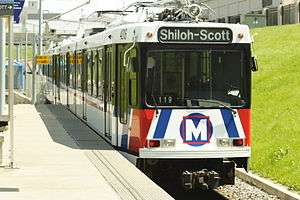 A Red Line MetroLink train leaves Union Station.
A Red Line MetroLink train leaves Union Station.
See also
References
- ↑ National Park Service (2009-03-13). "National Register Information System". National Register of Historic Places. National Park Service.
- ↑ "Union Station". National Historic Landmark summary listing. National Park Service. Retrieved 2008-06-28.
- ↑ "About - St. Louis Union Station". St. Louis Union Station. Retrieved 2016-05-11.
- 1 2 "Historic Station At End Of Line". Toledo Blade. November 1, 1978. Retrieved 2010-04-25.
- ↑ Artisans here put skills to work restoring St. Louis train station - The Milwaukee Sentinel - Aug 29, 1985
- ↑ Trains could return to St. Louis Union Station
- ↑ List of Recovered Buildings Archived November 17, 2009, at the Wayback Machine.
- ↑ "St. Louis Union Station - A National Historic Landmark with Memories As Major Rail Hub". St. Louis Front Page. Retrieved 16 November 2015.
Further reading
- Montesi, Albert and Richard Deposki (2002). St. Louis Union Station. Arcadia Publishing. ISBN 0-7385-1983-9.
- "National Register of Historic Places: Inventory - Nomination Form" (PDF). Missouri Department of Natural Resources. Retrieved 2008-05-30.
External links
| Wikimedia Commons has media related to Union Station (St. Louis). |
